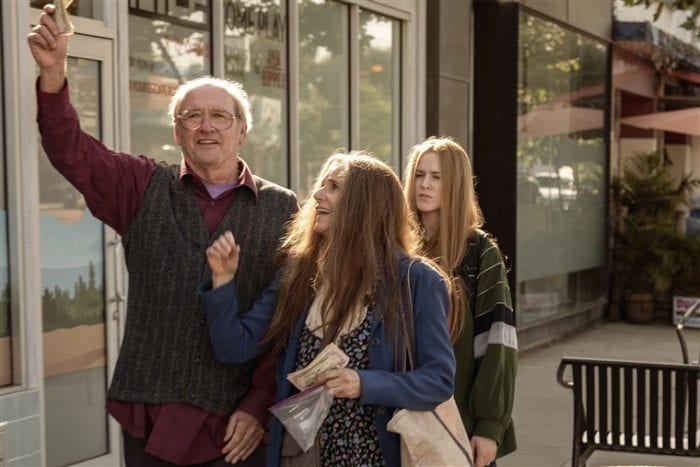Movie Review: ‘Kajillionaire’ explores the importance of human connection
Reviewed by Jeffrey Sanzel
Currently streaming on demand, Kajillionaire is either a very bleak comedy or a humorously edgy drama. Both disturbing and honest, it is a measured film, taking its time, but it never loses the tension that is introduced from its very first moments. Credit for this goes to the clear vision and masterful creativity of writer-director Miranda July who is working with a company of perfectly cast actors.
Kajillionaire is the story of a family of con artists living a hand-to-mouth existence in California. Robert and Theresa Dyne (Richard Jenkins and Debra Winger) and their twenty-six-year-old daughter, Old Dolio (Evan Rachel Wood), are petty criminals with an emphasis on petty.

Robert states flatly that he doesn’t want to be a “kajillionaire” — he’s very happy to just “skim.” Their crimes are predominantly minor, such as stealing from post office boxes or returning stolen goods. They perk-up at the possibility of the daughter earning $20 for covering a girl’s court-ordered attendance at a child-rearing class. They are minimalists in every sense of the word. Currently, they are three months behind on their rent — a $500 a-month office space connected to a soap factory that leaks bubbles into the living space at least once a day.
They are a codependent trio but are completely disconnected. Old Dolio is treated as an equal partner — she gets one third of the take — but strangely not as family. There is no sense of there ever having been parental guidance, interpersonal relationships, or love. Compared to the Dynes, the Kim family of Parasite are the Cleavers.
Everything changes when Old Dolio comes up with a scam that involves lost luggage, insurance, and a trip to New York. On the return flight, the parents are seated with a gregarious young woman, Melanie (Gina Rodriguez), who they befriend and then enlist to aid them. Robert and Theresa take to her and begin treating Melanie as a daughter. The true dysfunction of this turns much darker as the film progresses, building up to a particularly uncomfortable encounter centered around a hot tub.
Melanie, an optician’s assistant, is drawn to the family’s off-beat existence and proposes a job that involves finagling antiques out of her elderly clients. In one of the most powerful scenes in the film, a bedridden, dying man (Michael Twaine) asks them to make the sounds of a family. In a hideous lampoon of normalcy, they create idle chatter, underscored with the rattling of silverware and the playing of the piano.
In the meantime, Old Dolio becomes both intrigued by and jealous of Melanie. What starts off adversarial shifts to something almost undefinable, all hinging on a single word: “Hon.” What ensues is both uplifting and devastating as Old Dolio becomes aware of her family’s emotional bankruptcy. The climax is both surprising and inevitable.

To be sure, the Dynes are not the colorful cons of Hollywood movies. These are cheaters of the lowest sort, alternating between a sort of manic assuredness and twitchy doubt, second guessing their choices in a life that is a perpetual scrabble. There are also bursts of paranoia that derail them, resulting in flashes of anger. In addition to the minor rip-offs, they are entering contests under various names, winning things that they can never use. They are the definition of survival at its meanest, dragging through their days. This near-deadness is most pronounced in the neglected and, ultimately, emotionally starved and abused daughter.
Jenkins is an odd mixture of alpha and bumbler, a destructive father from hell. And yet seemingly, he is unaware that he is being anything other than kind. He wears so many masks, it is impossible to tell which is the true Robert. It is a detailed performance that bears re-watching.
Winger, practically unrecognizable as Theresa, is the almost fanatically committed wife whose child is nothing more than an appendage. She sees Old Dolio as utilitarian — someone who works with the family. She believes that her daughter is incapable of feeling so invests not even the slightest warmth into their dealings. It is a chilling, understated performance.
Rodriguez brings both charm and reality to Melanie. She makes Melanie incredibly present, a wonderful contrast with the others’ absence. She manages to imbue every moment as an opportunity for growth. While easily engaged, she is not a fool. The light of kindness radiates in Rodriguez’s Melanie. “Most happiness comes from like, dumb things,” she says, while making Old Dolio pancakes, part of a strange agreement that drives the latter part of the film. She understands the joy in even the smallest kindnesses.
But, if it is anyone’s film, it belongs to Evan Rachel Wood. Her ability to portray the pain of the emotionally stunted Old Dolio permeates every moment. She is both incredibly graceful and agonizingly awkward. Her face during the faux family scene for the dying man is a study in heartbreak. Even in her complete stillness, she projects a lifetime of confusion and disappointment. The film is her journey to the awareness of her dangerous addiction to her family.
Kajillionaire is not an easy film to watch. Its edge is as sharp as a scalpel. It is a portrait of an incomplete family at its ugliest. And yet, underneath it all, July finds light and hope in a dark and disturbing world.







